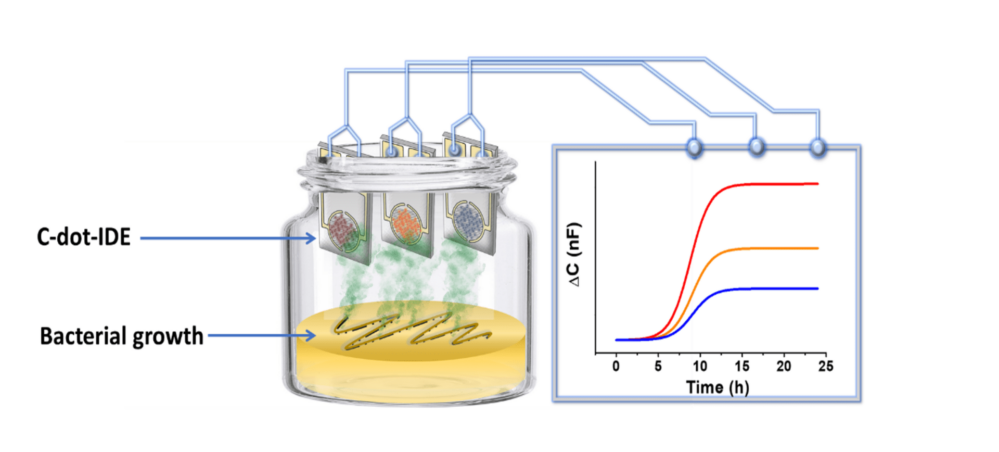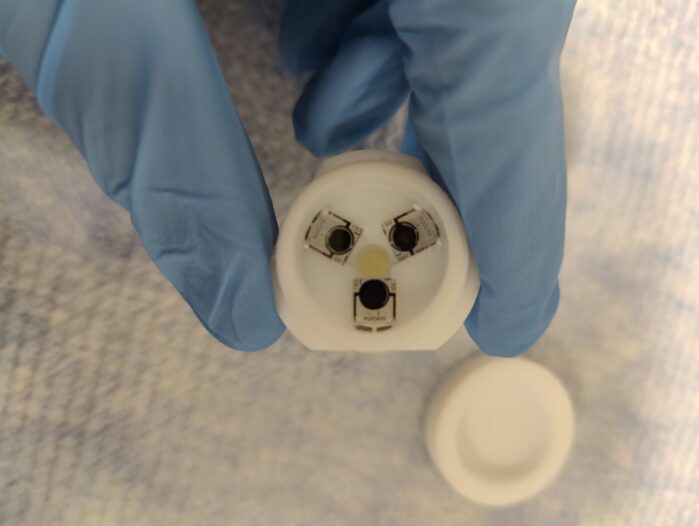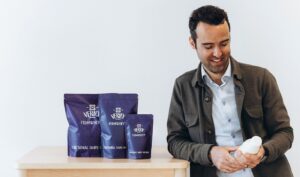Israeli startup Sensifi is emerging from stealth with a technology it claims could disrupt the food testing market by enabling rapid, on-premise detection of pathogens such as E. Coli and salmonella via an ‘artificial nose.’
Founded in January 2023, Sensifi uses electrodes coated with carbon ‘dots’ (nanoparticles of carbon) to detect volatile organic compounds (VOCs) emitted by bacteria and some other microbes, enabling food companies to get results in under an hour (as opposed to two-to-three days from a lab).
Using machine learning that analyses the VOC ‘fingerprint’ of bacteria by polarity matching between the c-dots and gas molecules, Sensifi’s electrical capacitance-based artificial nose can detect different strains very precisely, claims the firm, which deploys technology developed at Ben Gurion University by Prof. Raz Jelinek (VP R&D) and Ph.D. student Nitsan Shauloff (CTO).
“This facilitates, for the first time, real-time, continuous monitoring of bacterial proliferation and discrimination among bacterial species, both between Gram-positive and Gram-negative bacteria and between specific strains.”

Applications go well beyond food safety testing
While food safety testing is a key target market, Sensifi is also attracting interest in other fields including medicine, where the rapid identification of bacterial strains could help medics administer the most appropriate antibiotics more quickly to patients, CEO Modi Peled told AFN.
It is also talking to brewers keen to ensure the consistent quality of the yeast they are using in their fermentation, said Peled, who is aiming to raise $3 million in seed funding this year.
“Our technology is not only limited to bacteria. We’ve run a lot of tests on other microorganisms such as yeast. We recently started a test with a local brewery that was interested in our product, not for any contamination reason, but because they want to be able to detect wild yeast or yeast that they are not interested in, to ensure consistent quality.
“We’re also talking to local meat and dairy manufacturers to start tests with them as well.”
Results in under an hour
Prof. Raz Jelinek explained: “There are hundreds of thousands of deaths every year from foodborne illnesses caused by bacterial contamination. Companies test for foodborne pathogens but there are high shipping and handling costs to send samples to external labs. Then it can take at least two days to get the results back because they have to take the samples and put them in agar solutions that are suitable for growing bacteria to see what’s in there.
“Our approach basically gives them the ability to do bacteria testing in their own facility and get results in under an hour.”
Peled added: “Our technology comprises the sensor itself and the brains behind it, the machine learning system. We see potential not just in food production facilities, but anywhere that stores food as well.”
Asked about IP, he said: “The patent ended its 12 months PCT (patent cooperation treaty) period a few days ago and we’re submitting it to national registration in the US, Japan, the EU, Israel and more.”
Business model: Sensing as a Service
Sensifi plans to sell the sensors to clients at low cost but would make its money primarily via a subscription model, said Peled.
“It’s what we call SaaS but instead of Software as a Service, we’re calling it Sensing as a Service. We are building a database looking at the behavior of bacteria in different scenarios of temperature, humidity, and other variables. Once you are connected to the database, you’ll get an alert on your phone or laptop that says ‘Hey guys, you have salmonella in this batch or E. Coli in that one.’”
As for the business case, he said, savings from avoiding product recalls are obviously key, along with savings from being able to move products more rapidly through the supply chain without having to wait days for microbiological testing results. “The cost of recalls can run into hundreds of millions. But we’re also talking about human lives here.”
A second application of Sensifi’s technology could enable consumers to detect food spoilage through labels that change color as certain gases such as ammonia are emitted from meat, fish, chicken, and other foods, says the company.





